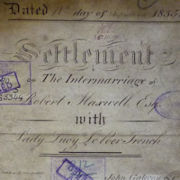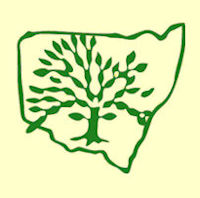Program
Sessions
Note: the talks will be recorded and made available to those who register for the conference.
Welcome – 09:45
Acknowledgement of country and welcome from the President
Session 1 – 10:00 – Clive Smith

Topic:– Dig Deeper into the Colonial Secretary's Records on Ancestry
The Colonial Secretary's records comprise one of the most valuable sources of information on the history of the Colony of New South Wales and the lives of the people. There are two collections of these records on Ancestry.com:
- New South Wales, Australia, Colonial Secretary's Papers, 1788-1856
- New South Wales, Australia, Colonial Secretary's Letters, 1826-1856
Both of these collections comprise images scanned from microfilm and microfiche copies of records held by the New South Wales State Archives.
The first collection is based primarily on the Colonial Secretary's Papers that were included in the Archives Resource Kit, but does include some additional material (for example, copies of letters sent to Moreton Bay between 1832 and 1853). This collection is indexed (using the comprehensive index covering the period 1788 to 1825), and consequently can be searched (except for records not included in that index). It can also be browsed, but only with considerable patience as some sections have many thousands of images.
Only a very small portion of the second collection is indexed and searchable (for example, a search for the name "Smith" finds only 12 results), so it has to be browsed. When browsing, the handwritten index pages of the various letter books and registers can be used to identify relevant documents that can then be located by browsing to the relevant page number. However, browsing is complicated by Ancestry's misplaced assumption that all the records on a reel of microfilm belong to the same series or volume.
This presentation will demonstrate how to find the records you want in these vast collections.
About Clive
Clive worked in a number of archive offices here and overseas. He has been pursuing family history for many years. He has a strong involvement with the Port Macquarie Family History Society and local history group. He has been Treasurer of this Association since (forever?).
Session 2 – 11:00 – Andrew Redfern

Topic:– AI and Family History
Are you curious about the role of Artificial Intelligence in family history research? Do you want to see concrete examples of AI's current applications for family historians? Are you concerned about using AI in genealogy ethically and responsibly?
Dive into these topics and more at our comprehensive presentation, "AI and Family History." This session aims to demystify the intersection of AI technology and genealogy through a detailed exploration of both theoretical and practical applications. Our presenter, Andrew, will start with a basic introduction to this evolving field, covering essential concepts and definitions. He will discuss foundational principles for using AI tools in genealogy.
Andrew will share practical examples from his own research, illustrating AI's capabilities to transform data, write ancestor biographies, work effectively with records, create images and suggest new research avenues. The presentation will feature live demonstrations of several tools, including ChatGPT, Transkribus, and Perplexity, focusing on both free and paid options suitable for individuals and societies alike.
Discover the latest and most effective AI tools available, and learn how they can be specifically applied to enhance family history work. Not only will the tools be demonstrated to highlight their practical use and benefits but potential pitfalls and ethical dilemmas that may arise will also be addressed.
About Andrew
Andrew is a keen family historian with an interesting array of ancestors including convicts, murderers, priests, wealthy gentleman, travelling musicians and the odd asylum inmate. An active member of the Society of Australian Genealogists, he has a particular interest in utilising technology more effectively in the work of family historians and sharing findings in creative ways.
12:00 – Lunchtime networking on Zoom
13:00 – Award presentations
Session 3 – 13:15 – Nick Reddan

Topic:– The Registry of Deeds Dublin and family history
Nick's talk covers what there records are and why they are important for family history. He will also discuss using the images on familysearch.org and the Registry of Deeds Index Project Ireland.
About Nick
Nick has been involved in family history for over thirty-five years. He is a fellow of the Irish Genealogical Research Society (IGRS) and of Family History ACT (FHACT). He was president of FHACT for six years, treasurer of Australasian Federation of Family History Organisations (AFFHO) for six years and he has been a member of the Association's management committee since 2014.
In April 2007, Nick started the Registry of Deeds Index Project Ireland. He still manages the project today. The aim of the project is to make the records of the Registry of Deeds more accessible to family and local historians.
Session 4 – 14:15 – Ruth Graham

Topic:– A framework for multidimensional family history research
We have never had it so good in family history with more and more available and indexed records to apply to our family situation. Online database platforms, websites, tools, digitisation programs have all brought the abundance of information to our homes. When we dig deep, we find these plentiful resources. How can we more simply understand these resources without being overwhelmed?
This presentation introduces a framework designed to empower genealogists and family historians to explore diverse archival sources and information repositories. This framework is in 3 parts: categories of research records; platforms and organisations that are record providers; and the research methods toolkit for delving deep into the possibilities of family history across geographical, cultural, and temporal boundaries.
Central to this framework is the integration of an expansive array of archival sources, spanning traditional repositories such as governmental records, church registries, historical newspapers, alongside emerging digital databases, oral histories, material artefacts, social media, academic research, AI, and DNA analysis tools. By harnessing the collective insights gleaned from these disparate sources, family historians can achieve a greater understanding of their pedigrees within a historical context.
Ruth will draw from case studies from her own research that draw on unique resources including those from historical church, education, and insurance records, as well as connecting with local and international family history societies to find out more concerning her family’s past.
About Ruth
Ruth Graham is the Chief Executive Officer of the Society of Australian Genealogists. Ruth is a family historian working professionally as an education and research manager. Ruth regularly presents webinars and as part of courses for the SAG and when she has time can be found online, in an archive, or modelling DNA matches, trying to push her family back reliably into the 18th century and beyond. She holds certifications and qualifications from universities in Australia and the United Kingdom alongside a Certificate in Genealogical Research from the Society of Australian Genealogists.
Ruth has been a member of the NSW & ACT Assoc of Family History Societies Inc. Management Committee since 2020 and the Executive Committee of the Family History Federation since 2023.
Session 4 – 15:15 – Closing Question and answer session
End of conference 15:45

